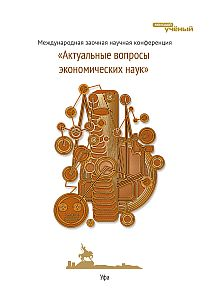E-commerce in the enterprise’s system of innovation management
Автор: Никифорова Елена Вадимовна
Рубрика: 14. Экономика и организация предприятия, управление предприятием
Опубликовано в
международная научная конференция «Актуальные вопросы экономических наук» (Уфа, октябрь 2011)
Статья просмотрена: 46 раз
Библиографическое описание:
Никифорова, Е. В. E-commerce in the enterprise’s system of innovation management / Е. В. Никифорова. — Текст : непосредственный // Актуальные вопросы экономических наук : материалы I Междунар. науч. конф. (г. Уфа, октябрь 2011 г.). — Уфа : Лето, 2011. — С. 115-116. — URL: https://moluch.ru/conf/econ/archive/11/993/ (дата обращения: 04.04.2025).
- The explosion of
information associated with the rapid growth of information and
communication technologies happened at the beginning of the third
millennium and the development of electronic commerce has become an
integral part of the innovative company’s management system.
This time we face an introduction of automation systems and
enterprise management (ERP-systems). ERP known as Enterprise
Resource Planning is a widely practiced technology-based material
management system. Introduced during the early 1990s, ERP was the
outcome of big business' push for a more cost efficient way to
manage warehousing and inventory costs by way of integrating
technology into planning, organization, production and forecasting.
The world annual market growth of ERP-systems is up to 35-40%.
- The development of the world market of ERP-systems is associated with the regular use of their advantages, such as integration, large quantity of information (a company can build a very large catalogue with a lot of information on the web), lower transaction costs, improving product quality and planning, the formalization of business processes and providing "up-to-date" information. The amount of trade conducted electronically has grown extraordinarily with widespread Internet usage. The use of e- commerce is conducted in this way, spurring and drawing on innovations in electronic funds transfer, supply chain management, Internet marketing, online transaction processing, electronic data interchange, inventory management systems, and automated data collection systems.
- The most important factor is that ERP-systems of e-commerce helps to create intercorporate relationships between ERP-systems suppliers, consumers and individual corporate management systems are becoming a part of global electronic market.
- Despite the high cost of ERP-applications, financing of ERP-systems’ introduction is not the main difficulty from the opinion of business leaders. More important factors are the project's scale, staffing and risk management.
The forms of distribution of the product’s information are catalogues and reference system, Web server and paid business inquiry.
Catalogues and reference system greatly facilitate the work of the Internet users. The interface of the reference system gives the possibility to organize the search of the necessary information. This search is free and the information provider gets profit due to the large volume of advertising on the most visited servers.
The main aim of Web server is to increase the number of readers of some publications. Usually the distribution of this information product is as follows.
Special information system is organized for the work in the sphere of entrepreneurship, associated with the collection, processing, analysis, classification and design of different kinds of information. Special consulting firms provide the necessary information in the fields of business, finance, marketing, etc. They can also provide information on the exchange rate of currencies and on the stock exchange.
Online purchasing is very convenient for customers and can provide competitive advantage for the vendors. According to Cunninghum, CISCO’s director of advanced customer services, “we roll something out, put it on the web with a secret url, show a couple of dozen customers, listen to their comments, true it, tweak it, let it out. Six months later we were going to have a change or two. We plan for it. It’s not a surprise, not a shock, nobody’s hurt. Our most successful tools (commerce agents), became that way because customers said, ‘Its what I want. I want the output on the screen, in e-mail, or a fax.’ Boom! We were not so smart; we just do what the customers tell us.”
The advancement of E-commerce technologies has led to new possibilities for companies to access new markets and reach new customers that were not possible before. It gives companies an opportunity to create value with low financial resources and marketing efforts. E-commerce also reduces the importance of location for conducting sales, since the virtual market is accessible, in most parts of the world, at anytime and anywhere. It also eases for large and small businesses to communicate the marketing message in the domestic and international market.
- The success of the modern company is determined by its ability to transform into e-global enterprise and maximize the opportunities of electronic commerce. Recent changes in business processes are associated not only with the necessity to conduct business processes online, but with the importance of technology adoption of e-commerce at all stages of the value chain. Therefore, this time ERP-systems should become the most important part of the enterprise, improve companies' competitiveness in the global market and promote the internationalization of the world economic relations and foreign economic globalization processes.
- The development of the world market of ERP-systems is associated with the regular use of their advantages, such as integration, large quantity of information (a company can build a very large catalogue with a lot of information on the web), lower transaction costs, improving product quality and planning, the formalization of business processes and providing "up-to-date" information. The amount of trade conducted electronically has grown extraordinarily with widespread Internet usage. The use of e- commerce is conducted in this way, spurring and drawing on innovations in electronic funds transfer, supply chain management, Internet marketing, online transaction processing, electronic data interchange, inventory management systems, and automated data collection systems.
References:
Al-Mashari, M. (2002). Electronic commerce - A comparative study of organizational experiences. Benchmarking: An International Journal , 9 (2), pp. 182-189.
Daniel, E. M., & Grimshaw, D. J. (2002). An exploratory comparison of electronic commerce adoption in large and small enterprises. Journal of Information Technology , 17, pp. 133-147.
|
Пример. Введите "privet" и нажмите пробел, чтобы получить "привет".
|
|











